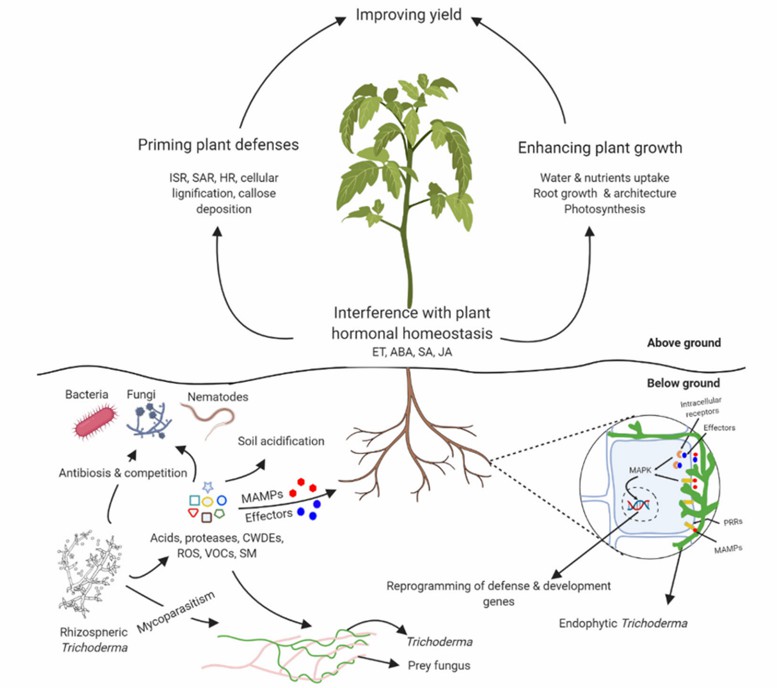Lifeasible focuses on plant protection. We value the use of microorganisms in plant protection and provide services to help decipher plant-beneficial microorganism-pathogen interactions for better development of biocontrol applications.
Research in plant-beneficial microorganism-pathogen interactions can help develop beneficial plant-microorganism partnerships to protect plants. Microbial-based biocontrol has a vital role in plant protection. Some bacteria (e.g., Bacillus, Pseudomonas, Streptomyces, and Paenibacillus) and some fungi (e.g., Trichoderma, yeast, and Glomus) provide various benefits to plants, including inducing plant defense, promoting plant growth, inhibiting pathogen growth, and increasing plant abiotic stress tolerance. Several species have been shown to form partnerships with different host plants, acting as beneficial avirulent symbionts or endophytes. The symbiotic relationship between beneficial microorganisms and host plants benefits both parties. For example, interactions between Trichoderma spp. and plants help with their resistance to plant pathogens (Fig. 1). Overall, studying the mechanisms of plant-beneficial microorganism-pathogen interactions can help develop biological control strategies for plant protection.
 Fig. 1 Trichoderma–plant–pathogen interactions map (Alfiky and Weisskopf, 2021).
Fig. 1 Trichoderma–plant–pathogen interactions map (Alfiky and Weisskopf, 2021).
Lifeasible offers services to help explore the specific mechanisms of plant-beneficial microorganism-pathogen interactions to help decipher the theoretical basis for beneficial plant-microorganism partnerships.
Plant-beneficial microorganism interactions
We help explore the effects of specific beneficial microorganisms on plants. We help explore changes in many aspects of plants caused by beneficial microorganisms, including changes in photosynthesis, phytohormones, plant secondary metabolites, plant immune defense structures (e.g., plant cuticle, callose, silica layer), plant reactive oxygen species, plant signaling, and resistance gene expression.
We help explore the effects of plant secondary metabolites, particularly volatile organic compounds, on beneficial microorganisms, including changes in protein expression, secondary metabolite production, and the secretory composition of beneficial microorganisms.
We have gained extensive experience in studying plant-microorganism interactions. We master specialist methods and advanced instrumentation to help analyze changes in plants caused by beneficial microorganisms.
Beneficial microorganism-pathogen interactions
We help explore the effects of specific beneficial microorganisms on plant pathogens. Beneficial microorganisms can protect plants by competing for nutrients, secreting anti-pathogen components, and parasitizing plant pathogens. We help explore these inhibitory effects of beneficial microorganisms on plant pathogens and detect changes in the proteome and metabolome of plant pathogens in response to components of beneficial microorganisms.
Components of plant pathogens can also induce changes in protein expression and secondary metabolite production in beneficial microorganisms, and we help explore the occurrence of such interactions.
We can help observe the interaction of beneficial microorganisms with plant pathogens using electron microscopy. We also have extensive experience in microbial metabolomic and proteomic analysis. We can achieve a wide range of studies of beneficial microorganism-plant pathogen interactions.
Crosstalk between several partners
Studying tripartite systems can reveal important crosstalk between different interacting partners, which might not happen in bipartite interactions. We help explore the unique effects of plant-beneficial microorganism-pathogen interactions that differ in bipartite interactions. Depending on the client’s needs, we help explore the effects of pre-inoculation with beneficial microorganisms or plant pathogens on plant-beneficial microbe-pathogen interactions.
Lifeasible offers professional services to help explore plant-beneficial microorganism-pathogen interactions. In some cases, Plant-beneficial microorganism partnerships also help plants to resist pests and abiotic environmental stresses. We can also provide bespoke services to help study these interactions. Please contact us for assistance.
References